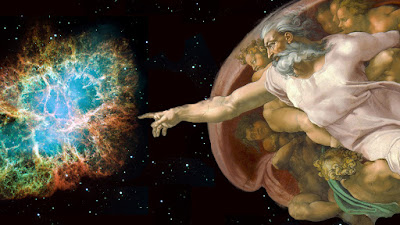Featured
- Get link
- X
- Other Apps
Is God and Science Incompatible?
Can you believe in God and science at the same time?
So-called “New Atheists” like Richard Dawkins and scientific materialists like Neil deGrasse Tyson certainly don’t think so. To them, religion gets in the way of science. In their view, more science leads to less God.
This is not a new position. It was first expressed over a hundred years ago by English physician John Draper in a book titled, A History of the Conflict Between Religion and Science.
Draper, who was deeply influenced by Darwin’s then-new theory of evolution, regarded organized religion as a direct and existential threat to the advancement of science. As he put it “. . . [Religion] and Science are… absolutely incompatible; they cannot exist together…mankind must make its choice—it cannot have both.”
So, are science and religion inevitably in conflict? In some respects yes however when it comes to Christianity, apart from the institutionalized apart, has it always been?
Well, not exactly.
In fact, the giants who established modern science—astronomer Johannes Kepler, chemist Robert Boyle, physicist Sir Isaac Newton and others—were Christian men. They didn’t see any conflict between science and the God of the Bible. On the contrary: they thought that by doing science, they were discovering God’s design and revealing it to mankind.
Indeed, it’s no exaggeration to say that the Judeo/Christian religious tradition led directly to modern science.
To back up this claim, Cambridge University historian of science Joseph Needham posed a famous “Why there? Why then?” question.
Why there—in Europe. Why then—in the 16th and 17th centuries.
Why didn’t modern science start somewhere else before then?
After all, the Egyptians erected pyramids.
The Chinese invented the compass, block-printing, and gunpowder.
Romans built marvelous roads and aqueducts.
The Greeks had great philosophers.
Yet none of these cultures developed the systematic methods for investigating nature that arose in Western Europe during the 16th and 17th centuries.
This realization led Needham and other historians of science such as Ian Barbour and Herbert Butterfield to look for some other “X factor” to explain why “the scientific revolution” occurred where and when it did.
Here is the conclusion they reached:
Only the Judeo-Christian West had the necessary “intellectual presuppositions” to enable “the rise of science.”
So, what were those presuppositions?
We can identify three. All find their origin in the Judeo-Christian idea of a Creator God who fashioned an ordered universe.
First, the founders of modern science assumed the intelligibility of nature—that nature had been designed by the mind of a rational God, the same God who also made the rational minds of human beings.
Thus, these men assumed that if they used their minds to carefully study nature, they could understand the order and design that God had placed in the world.
Second, they assumed an underlying order in nature.
This was best expressed by philosopher Alfred North Whitehead who argued, “There can be no living science unless there is a widespread instinctive conviction in the . . . Order of Nature”—a conviction he attributed to belief in “the rationality of God.”
This idea led to the unprecedented use of mathematics to describe the orderly processes at work in the world, and inspired the invention of better instruments, such as telescopes and microscopes, to see that order.
And third, these founders of modern science presupposed the contingency of nature. This simply means that God had many choices about how to make an orderly world.
Just as there are many ways to design a clock, there were many ways that God could have designed the universe. To discover how He did, scientists could not merely deduce the order of nature by assuming what seemed most logical to them; that is, merely using reason alone to draw conclusions, as the Greek philosophers had tried to do.
For example, the Greeks thought that since the most perfect form of motion was circular, they assumed that the planets must have circular orbits—something Kepler later refuted by careful observation.
Indeed, because of their theological convictions the new scientists realized they would have to observe, test and measure in order to understand God’s design.
To these men nature was like a book—a form of divine communication intelligible to human investigation.
For this reason, they also developed the concept of “the laws of nature,” implying God’s governance over the natural order.
Science was a way to decipher that order. Science is a tool that God gave humanity so that through that which was created we might find our Creator.
The idea that science and religion are in conflict is a popular belief today. But the history of science shows otherwise.
All of us—laymen and scientists alike—owe a great debt to the Judeo-Christian tradition.
Without that tradition we’d be living in a much more primitive world—morally and scientifically.
- Stephen Meyer
Popular Posts
How should followers of Jesus Christ vote in the USA?
- Get link
- X
- Other Apps
The Moral Argument for God’s Existence.
- Get link
- X
- Other Apps



Comments
Post a Comment